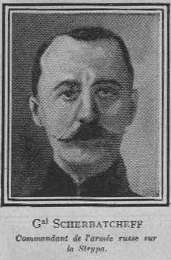Dmitry Shcherbachev
| Dmitry Grigorevich Shcherbachev | |
|---|---|
 | |
| Born | 1857 |
| Died | 1932 |
| Allegiance |
|
| Service/branch | Russian Imperial Army |
| Rank | general |
| Commands held | 11th Army |
| Battles/wars | World War I |
Dmitry Grigorevich Shcherbachev (1857–1932) served as a generally unsuccessful artillery commander in the Russian Army during World War I.
Shcherbachev advocated the use of French breakthrough tactics, consisting of heavy artillery attacks concentrated on a narrow front of the enemy's line. He was in command of the IX Infantry Corps at the outbreak of the war. Under the command of Nikolai Ivanov he used this tactic during the disastrous Russian campaigns in Galicia and Bessarabia.
In the Bessarabia offensive Shcherbachev led the Seventh Army. The breakthrough tactic allowed the defenders to attack his flanks, bringing the overall advance to a halt.
Likewise his tactics proved disastrous at the start of the Brusilov Offensive - some 20,000 men were lost in a failed attack along the Strypa. However, commander Alexei Brusilov's insistence on a secondary attack at Jaslowiec on 4 June 1916 produced the desired breakthrough. The southern wing of Bothmer, the German general, was turned.
This success enabled the rehabilitation of Shcherbachev's military reputation. On 11 April 1917 Shcherbachev replaced Andrei Zayonchkovsky as commander of the Romanian Front. After the Bolsheviks October Revolution in Petrograd was placed in charge by Symon Petlyura of the consolidated Ukrainian Front that united both the Southwestern and the Romanian fronts. On December 9, 1917 Shcherbachev signed a cease fire agreement with the Central Powers due to ongoing negotiations of the Treaty of Brest-Litovsk. By the Battle of Galați Shcherbachev faced assassination attempts and the loss of respect of his troops. Upon the declaration of independence of Ukraine on 22 January 1918 he resigned from his position and moved to Odessa where he joined the Committee of Southern Ukraine and later joined the government of General Wrangel. He subsequently fled into exile in France in 1919 and died in 1932.
Honours
- Order of St. Stanislaus, 3rd class (1879), 2nd class (1888), 1st class (1905);
- Order of St. Anna, 3rd class (1885), 2nd class (1896), 1st class (5 June 1911);
- Order of St. Vladimir, 4th class (1891), 3rd class (1899);
- Order of St. George, 4th class (1914), 3rd class 1915
- Gold Sword for Bravery (23 April 1915)
- Grand Cross of the Legion of Honour (France)
- Order of Michael the Brave, 3rd and 2nd classes (Romania)